Decentralised Energy in Camden
What are Decentralised Energy Networks?
Decentralised energy (DE) or district heating is a method of providing heating and hot water in a more cost-effective and sustainable manner, reducing fuel poverty and environmental impact, as well as improving energy security. The Council is committed to promoting decentralised energy directly through its own heat networks and also by encouraging its expansion through the planning system.
Decentralised Energy Networks (DENs) play a key part in reducing the carbon emissions of buildings in Camden and the operation and expansion of DENs will help contribute to delivering the Council’s Climate Action Plan 2020-2025. In 2015 we devised a DEN strategy for Camden which concluded several priority areas in which they could be developed. Download a copy of the study.
The below map displays the eleven priority areas that were identified as a result of this study. The five existing cluster areas are marked in grey and the six cluster areas identified with potential for future development are marked in red.

Somers Town Energy
A Decentralised Energy Network (DEN) is now operational Somers Town, supplying heating and hot water to over 600 homes, a school and communities facilities in the Somers Town Area. The network supplies six housing estates: Monica Shaw Court, Oakshott Court, Clyde Court, Goldington Estate, Mayford Estate and Tessa Jowell Court. A Combined Heat and Power (CHP) unit has been installed which produces low carbon electricity supplying the Francis Crick Institute, who has also helped fund the scheme.
CHP is a technology that simultaneously generates heat and electricity. It can be used in a single building with appropriate heating and electrical demands, but it works particularly well when a number of varied heat demands (for example, schools, housing and hospitals) are connected to the CHP through a district heating network. The network has reduced greenhouse gas emissions produced from providing heating and hot water to connected sites by approximately 300 Tonnes CO2e per year.
Funding from the Mayor of London for the Somers Town Future Neighbourhoods programme has helped to fund an assessment of potential options to reduce the greenhouse gas emissions of the network even further. To get a better understanding of how DENs work and the Future Neighbourhoods project, please see our short film on YouTube.
Gospel Oak DEN
The Gospel Oak network provides approximately 50% of the heat required for 1,449 homes across six estates, using waste heat from the Royal Free Hospital’s CHP. As a result of this scheme, around 2,800 tonnes of CO2 are saved per year.
Gower Street DEN
Operated by University College London (UCL), the Gower Street Heat & Power DEN serves the main UCL Bloomsbury Campus as well as a number of University College London Hospital (UCLH) buildings.
Bloomsbury DEN
The Bloomsbury Heat and Power Network is owned by a consortium of Bloomsbury universities and provides electricity and heat from two CHP units to a number of college buildings including Birkbeck and SOAS.
King’s Cross DEN
Argent has built a network in King’s Cross as part of their site-wide regeneration works. The energy centre for the site has been operating since 2012 and currently contains two CHP units with a third planned for future installation.